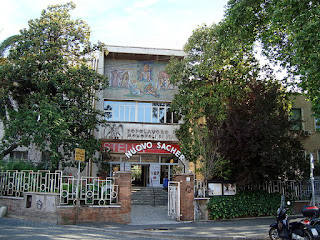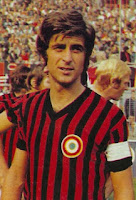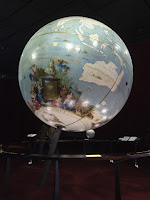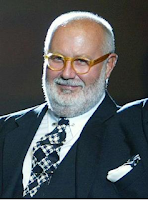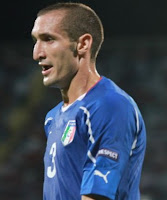Salomone Rossi - violinist and composer
Leading Jewish musician of the late Renaissance
The composer and violinist Salomone Rossi, who became a renowned performer at the court of the Gonzagas in Mantua in the late 16th and early 17th centuries and is regarded as the leading Jewish musician of the late Renaissance, is thought to have been born on this day in 1570. Jews had periodically been the subject of persecution in the Italian peninsula for hundreds of years. At around the time of Rossi’s birth, Pope Pius V expelled all Jews from all but two areas of the papal states and Florence established a ghetto, in which all Jews within the city and the wide Grand Duchy of Tuscany were required to live. The Mantua of Rossi’s day was much more enlightened than many Italian cities, however. Jews were not only tolerated but they were often allowed to mix freely with non-Jews. The liberal atmosphere allowed Jewish writers, musicians and artists to have an important influence on the culture of the day. The court of Mantua was not only renowned for its royal luxury but as a centre of artistic excellence. At the end of the 15th century the duchess Isabella d’Este Gonzaga actively sought out the finest musicians in Italy, bringing them to Mantua. Read more…
___________________________________________________________________
Andrea Palladio - world's favourite architect
Humble stonecutter became his profession's biggest name
Andrea Palladio, the humble stonecutter who became the most influential architect in the history of his profession, died on this day in 1580, aged 71. The cause of his death is not clear but some accounts say he collapsed while inspecting the construction of the Tempietto Barbaro, a church in Maser, a town in the Veneto not far from Treviso. He was initially buried in a family vault in the church of Santa Corona in Vicenza, the city in which he spent most of his life, but later re-interred at the civic cemetery, where a chapel was built in his honour. Examples of Palladio's work can be found all over the region where he lived and in Venice, where he was commissioned to build, among other architectural masterpieces, the Church of San Giorgio Maggiore, the focal point of the view across the lagoon from St Mark's Square through the Piazzetta. He built a substantial number of villas for wealthy clients across the Veneto region, some of them lining the Brenta Canal that links the lagoon of Venice with Padua. Others such as the Villa Capra, otherwise known as La Rotonda, famous for its symmetrically square design with four six-columned porticoes, can be found in open countryside near Vicenza. Read more…
_________________________________________________________________
Nanni Moretti –film director
Award winning filmmaker helped shape politics
Giovanni ‘Nanni’ Moretti, film director, producer, screenwriter and actor, was born on this day in 1953 in Brunico in the South Tyrol. Moretti has been a prominent opponent to Silvio Berlusconi’s governments and policies in Italy. In his 2006 film, Il Caimano, a comedy drama focusing on allegations about Berlusconi’s lifestyle, he played the role of Berlusconi himself. Moretti’s parents, who were both teachers, were from Rome but he was born while they were on holiday in Trentino-Alto Adige. His father, Luigi Moretti, taught Greek at Sapienza University in Rome. While growing up Moretti developed a passion for the cinema and water polo. He started making films for a hobby and played in the junior national water polo team in 1970. His first feature film, Io sono un autarchico - I am Self-sufficient, was released in 1976. Two years later he wrote, directed and starred in the film Ecce Bombo, which was screened at the Cannes film festival. This is still a cult film for many Italians. His film Sogni d’Oro won the Silver Lion at the 38th Venice International film festival. He is perhaps best known for the films Caro Diario - Dear Diary, in 1993 and La stanza del figlio - The Son’s Room, in 2001, which won the Palme D’Or at the 2001 Cannes Film Festival. Read more…
__________________________________________________________________
Cesare Prandelli – football coach
Led Italy to the final of Euro 2012
The former head coach of the Italian national football team, Cesare Prandelli, was born on this day in 1957 in Orzinuovi, near Brescia. Under Prandelli’s guidance, the Azzurri finished runners-up in the European Championships final of 2012 and qualified for the finals of the World Cup in Brazil in 2014. Despite winning a two-year extension to his contract, he quit after Italy’s elimination at the group stage in Brazil, which he considered was the honourable course of action after a very disappointing tournament in which the Azzurri beat England in their opening match but then lost to Costa Rica and Uruguay. As a player, Prandelli had been a member of a highly successful Juventus team in the early 1980s, winning Serie A three times and the European Cup in 1985 – albeit on a night overshadowed by tragedy at the Heysel Stadium in Brussels. After beginning his coaching career as youth team coach with Atalanta in Bergamo, his last club as a player, he twice achieved promotion from Serie B, with Hellas Verona in 1999 and Venezia in 2001. But it was his achievements in Serie A with Fiorentina that impressed the Italian Football Federation (FIGC). Read more…
Home







